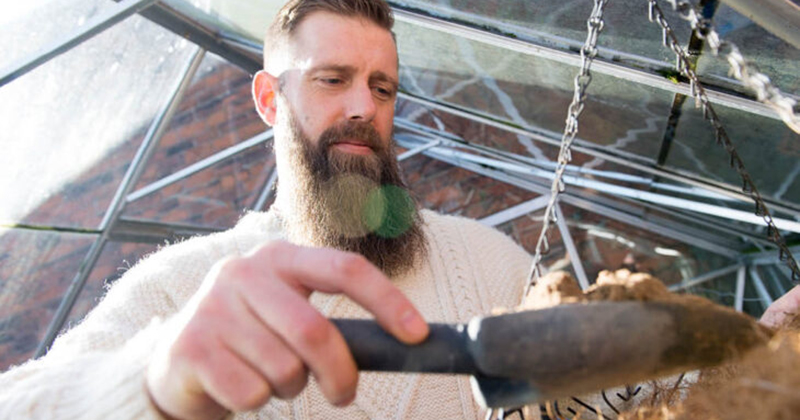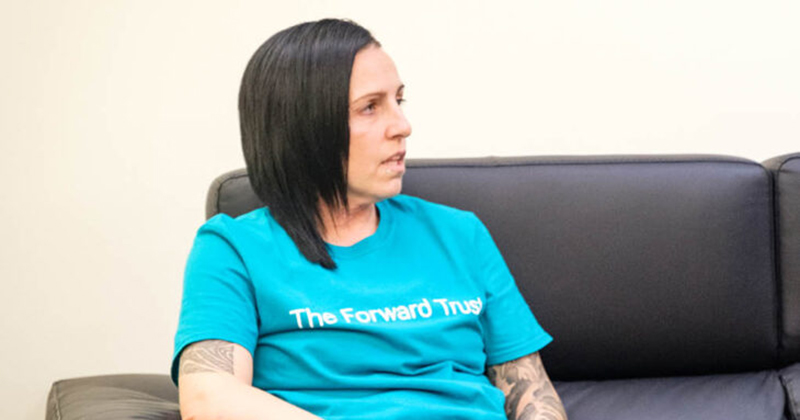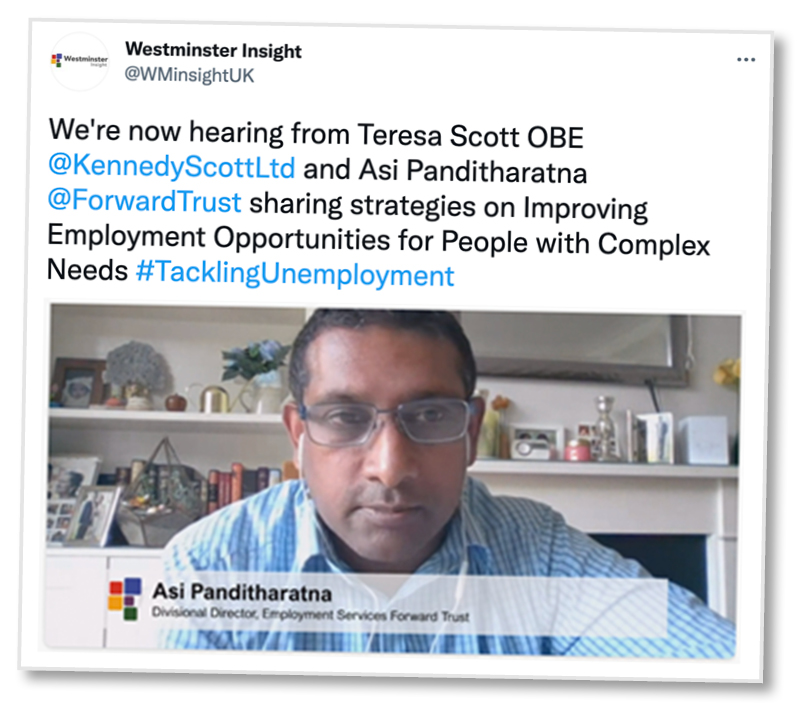Asi Panditharatna is tired of low expectations for former prisoners, drug addicts and the unemployed. He asks Jess Staufenberg why only certain people are thought of as ‘labour’
A few weeks ago the deputy prime minister came out with a grand possible solution to the HGV driver shortage causing havoc at petrol stations and food shortages across the country. Low-level offenders – those serving community sentences – could become HGV drivers as “a benefit for the economy and a benefit for society”, announced Dominic Raab.
Asi Panditharatna, director of employment services at charity and training provider The Forward Trust, is not wild about this kind of rhetoric.
His organisation delivers training and support to prisoners, those with substance addictions and the unemployed – some of the most vulnerable people in society. Although Raab has an important point when he says people with “some skin in the game” are “less likely to reoffend”, the proposal that offenders become HGV drivers also misses another, more important point, says Panditharatna.
“It’s always been my belief that ex-offenders and other vulnerable people need to be offered aspirational careers. If you’re in a low-wage job, you’re going to be tempted to re-offend, or at least move into the grey economy [informal work that isn’t properly taxed] instead.”
Panditharatna is talking from The Forward Trust’s offices in Kennington, south London. He joined in 2018, and on arriving in post he made the charity a member of the Association of Employment and Learning Providers.
By August this year it was one of just 88 training providers to win adult education budget (AEB) funding, after the government dramatically slashed the number of providers down from 208.
Slightly to Panditharatna’s surprise, his team won two AEB contracts: a devolved one under the Greater London Authority, specialising in ‘green recovery’ training; and a non-devolved contract in Kent called the ‘skills, training and jobs pathway’ for unemployed adults.

The charity wasn’t completely new to the AEB, having delivered digital skills, customer service and employability support for two years already, but the two new contracts this summer show it has not only survived the government cull, but (unlike many other providers) has been offered the chance to prove itself on a bigger scale.
It would appear Panditharatna’s relentless drive for higher standards is a not insignificant factor in this expansion. He leans in, warming to his topic.
“So now they’re saying ex-offenders ought to drive an HGV? I’m sick of hearing people talked about as ‘labour’ – they’re people, learners, participants,” he says. “What if someone doesn’t want to drive an HGV?”
In contrast to this kind of approach, Panditharatna has been working on a new offer for ex-offenders and former substance abusers – to become successful, self-employed entrepreneurs. It’s not a route ministers often, if ever, present as desirable for people on the fringes of society.
In fact FE students generally are not usually spoken about by the Department for Education as the business entrepreneurs of the future – more as employees to ‘fill skills gaps’.
“When I first joined here we had a small fund for people wanting to set up their own business, but I said, ‘Come on, let’s really get in there,’” he continues.
He spoke to the charity’s chief executive, Mike Trace, a former deputy drugs ‘tsar’ to Tony Blair (and formerly a frequent target of tabloid articles for seeking to make it easier for substance addicts to get treatment). “I said to Mike, we need coaches. So I wrote the job description for a social enterprise coach.”
The enterprise support programme, which launched off the back of Panditharatna’s strategy in 2019, is open to ex-offenders, those in recovery from addiction, those not in education, employment or training, and those “facing other challenges or barriers to starting your own business”.
They are each assigned an enterprise coach and, if needed, an additional business mentor, to go through everything from developing the ‘right mindset’, business planning, applying for funding and tax, plus masterclasses and workshops, including from auditing firm Deloitte. There are currently 75 people on the programme, which the charity raises funds for.
“But we want to have government contracts for this. You could run AEB ‘enterprise’ qualifications!” enthuses Panditharatna. “I like having government contracts, it keeps you sharp.”
The supportive nature of the programme is particularly important for those recovering from addiction, he explains. “These learners can be quite different from ex-offenders – it’s not necessarily that they are low skilled, they can be quite highly qualified, but they have an addiction. And once you’re in recovery, you’re in recovery for ever. So with substance misuse, you need that network. They want to stay in touch with us the most.”
Panditharatna recalls one ex-offender in recovery from addiction who joined the programme because he “didn’t want to work for anyone else” and went on to build a successful print and design business with his wife.

Given that in 2019, 29 per cent of adult offenders re-offended, and the figure for juvenile offenders was 38 per cent, tailoring learning to what genuinely interests and enthuses people might be a lesson worth noting by ministers.
The key is to make multiple aspirational pathways available, says Panditharatna. “Our enterprise pathway is not as big as our AEB provision, but it’s about being able to offer it anyway.”
Taking heed of skills gaps is still important, he continues – the charity’s ‘Restart’ programme helps people on universal credit into a job, and its AEB provision in London delivers the NCFE ‘climate change and awareness’ qualification at level 2, with guaranteed job interviews at the end.
This year his team also started delivering the ‘employability practitioner’ apprenticeship, to reflect a growing need for careers advisers as more people switch jobs. Two of the apprentices have been on universal credit themselves, so can talk with “real empathy” to their clients, he says.
But society has not caught up with the idea of aspirational, motivated, talented people who are recovering from addiction or have recently left prison.
“When we have people with us who we know we can progress, it’s so hard to get them on to an apprenticeship. I have to call people and pull in favours just to get them on. Why can’t we give them a break?
“It’s about removing unconscious bias. It’s easier to employ people who have the A-levels and the networks and who look good on paper. There are very few providers who are keen to look at our learners. It’s OK to get rejected sometimes, but not all the time. With ex-offenders especially, it’s very, very difficult.”
There are very few providers who are keen to look at our learners
Perhaps Panditharatna sympathises in part because of his own experiences. He says he struggled academically at school and didn’t enjoy its rigid structure, being much happier at Windsor and Maidenhead College (now East Berkshire College), where he could be more independent. “I was a bit of a late developer in life. I understand with some of our learners how frustrating it can be.”
As someone who has valued independence very much himself, Panditharatna is a rare voice in advocating it as valuable, and attainable, for learners who may be talented, capable, and vulnerable all at the same time.

This takes him on to another problem in the system. “There needs to be parity between community learning and prisons,” he says. “There’s got to be the same level of quality of service. Why can’t someone like me who went to college have the same experience if I was in prison?”
Panditharatna sets a similarly high bar for those charities involved in training. In his previous role he was managing director of apprenticeships and employability at charity training provider Catch22, and endured two ‘requires improvement’ judgments from Ofsted.
Other people might have left, but he faced it down, bringing in multiple experts to help instead. In 2015 the charity got its first ever ‘good’, which Panditharatna describes as “the best feeling ever”.
“Charities delivering skills should be moving towards ‘outstanding’,” he tells me. “We shouldn’t be thinking just because we’re charities, or we work with disadvantaged people, that we shouldn’t be aiming for outstanding.”
The Forward Trust is awaiting its first Ofsted inspection: “I welcome it.”
Charities delivering skills should be moving to “outstanding”
So when Raab, or indeed any ministers, talk about plonking learners whom they assume to have few life options into lorries, they may want to think again.
Meanwhile, FE students up and down the country are being hailed as the solution to the country’s skills gaps (even as the curriculum to age 16 remains heavily academic). But Panditharatna’s message is this: whether privileged, an ex-offender, or a recovering addict ̶ no one is ‘labour’.









Congratulations Asi!